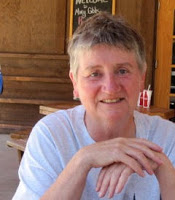delayed writing about this subject longer than I normally do about selected
topics because I was torn between writing about a painful truth regarding my
mother or resisting it and writing something fictional and entertaining, simply
as an antidote. I finally decided to
stick to facts but to keep it as short as possible.
you have to understand my mother’s background.
Several terrible events combined to damage her emotionally.
apparently, her own mother was very fond of her first-born daughter but did not
express much love or support for my mother.
This only enhanced my mother’s deep attachment to her father, evidently
a very caring, loving man, who also was highly admired for his many skills and
successes. He was a professor of physics
and chemistry, kept bees, took the family on long camping trips (which included
Colorado back when it had mostly dirt roads), collected Indian arrowheads, and
played classical violin. Unfortunately,
he was exposed to radiation from his early lab experiments and died painfully
of cancer at age forty-eight. My mother,
at the time, was at that critical age of fifteen and deeply suffered the loss
of her father.
her mother developed the strange notion that she needed to remarry but retain
the same surname. Consequently, she
blindly married her late husband’s uncle, until then unmarried and a whole
generation older. It turned out that
this man became the “stepfather from Hell.”
start with, he decided that the family must abandoned their beloved home (once
owned by Mary Todd Lincoln’s family) and move to his home-town. My mother packed her few prized possessions
into a trunk in anticipation of the move.
The stepfather, however, left the trunk behind, later stating that “there
wasn’t enough room to take it.” My
mother was very hurt and never forgot the callous loss of her possessions.
went from bad to worse. Very quickly, my
mother and grandmother discovered that this man had a violent temper and
frequently exploded into tirades of verbal and even physical abuse, hitting
them. When the stepfather discovered
that my mother was saving a little money during summers working as a waitress
so she could go to college, he stole all her money to pay for ill-chosen stocks
that he had bought. He lost all the
stocks and money in the Great Depression.
This man chose not even to keep his disdain for the family private. He frequently spoke ill of them to friends
and neighbors, telling terrible falsehoods about them.
wasn’t until many years later when I was in my forties did I hear hints from my
mother that this “stepfather from hell” had gone every morning into her
bedroom. Apparently, my grandmother
never knew or was too afraid to do anything about it. My comprehension of this trauma became
clarified by my father, who spoke to me shortly before his passing. He stated that, for a while after he and my
mother were married, she would wake up every morning, screaming. I was absolutely shocked. In retrospect, I realized that this hysteria
had been expressed in many ways during my childhood.
my childhood and adult life, I witnessed my mother’s deep-seated fear and
anxiety. I realize that, no matter how
hard she struggled to do the right things with her life and her family, to take
on and excel in numerous activities, she continually was plagued by those fears
and anxieties. She feared the world; she
feared people. Many times, I heard her
bitterly declare, “I hate men; I just hate men.” She feared anyone whom she did not
understand. She feared blacks and
foreigners. She feared and disliked
homosexuals. Once, when I was watching a
documentary on Africa, she rushed over to the TV and turned it off, stating, “I
don’t want you to watch that. All
white-hunters are homosexuals.”
another consequence, she tried to control all people and the world around
her. Anyone or anything that she could
not control upset her. Everything had to
be just the way she thought it should be, otherwise she would worry, sometimes
even panic, and become hysterical.
unfortunate, known psychological phenomenon is that one way traumatized people
attempt to cope is to adopt many of the same hurtful behaviors that had caused
them harm in the first place. This was
true with her. When I was young, she
once said that she hoped that she never would become like her stepfather – – –
but she did. Very often, when she feared
that she was not in control, she shouted in rage. I recall seeing her screaming at my oldest
brother and beating him. She hit my
father so hard that she burst his eardrum.
I went to university in Europe, my parents drove me to the university
campus. It was late evening and becoming
dark. My father took one wrong turn
where there was very little street-light and no outlet. He had to turn around. Simple enough; however, my mother panicked
and began screaming hysterically. At the
time, I did not understand. Now I do.
brothers and I have realized for some time that, even though we were, what
psychologists call, a “looking good family,” word got around about my
mother. New neighbors were warned to
avoid getting to know my mother. We
brothers and my father suffered long-term damage from that environment. My father, early on, withdrew as much as he could
into his own world, finding every reason to go to his office, take the car for
a wash, or do some other chore that would take him away from the house. My oldest brother adopted the same
dictatorial and controlling behaviors with his family. He also eventually disassociated himself from
our parents and never went back to see them, even at their funerals. My middle brother became the rebel and stayed
away from the family as much as possible, even disappearing for some years
after his marriage. My late friend Dr.
Bob observed in me, what he said was, a rare trait of reacting to my past
experiences by instinctively developing an unusual degree of sensitivity and
empathy for other people, something that apparently helped me to be affective
in my profession. Apparently, I was good
at taking care of other people, but not myself.
despite the damage done to our family, I cannot but help but feel great
sympathy for my poor mother. She
suffered greatly in her childhood, and I am not sure how much true joy or love
that she felt in her life. As for me, I
know that, as they say, “I’ve carried a lot of baggage throughout my
life.” It took me some years to
understand why.
now that I have told you this story, I will put it on our blog for others to read
and to think about. But, for myself, now
that I have read this unhappy tale to you, I will dispose of it and remove it
from my computer. It is too painful for
me to keep or to read again.
people and their life stories. I also
realize that, although my own life has not brought me particular fame or
fortune, I too have had some noteworthy experiences and, at times, unusual
ones. Since I joined this Story Time
group, I have derived pleasure and satisfaction participating in the group. I do put some thought and effort into my
stories, and I hope that you find them interesting.

